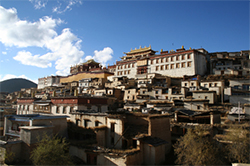Foreign media barred from Tibet in breach of Olympic media access pledge

19.03.2008
By Michael HerbornJournalists have been barred access to Tibet to cover recent unrest by ethnic Tibetans in the region, which has been controlled by China since 1950. Supporters of Tibetan autonomy are using the Beijing Olympics, which take place in August 2008, as a focal point for political protests.
The Foreign Correspondents Club of China (FCCC) has been informed of over twenty reporters being turned away or forced to leave areas with high concentrations of Tibetans, including the capital of Tibet, Lhasa, and Xiahe in Gansu Province.
 |
|
The Potala Palace in Tibet, spiritual home of the Dalai Lama. Lhasa has been witness to recent unrest over Tibetan autonomy. |
“Reporting interference is not in the interest of the Chinese government which is trying to show a more open, transparent and accountable image to the world,” says FCCC President Melinda Liu.
Some journalists reported to FCCC that they are being barred by from entering Tibetan areas by the police, while widespread censorship of the event within the Chinese media is making reporting conditions even harder.
“Such interference is not in keeping with reporting regulations adopted during the Olympics period – and is especially not in keeping with the international community's expectations of an Olympic host nation,” said Liu.
Tania Branigan of the Guardian newspaper in Britain also reports being barred from entering the prevented from filming a peaceful candlelit protest at a University of Minorities in Beijing, the host city of this summer’s games and far away from the unrest in Tibet.
No athlete boycott
Discussing the recent unrest at a European Union meeting in Slovenia, European sports ministers were united in their refusal to call for a boycott despite the mounting unrest and restrictions on media access in Tibet.
Christiane Hohmann, a spokeswoman for the European Union's executive commission, told the Associated Press news agency that “such a boycott would not be the appropriate way” to voice the European Union’s concerns over human rights in Tibet and China generally.
Their stance was echoed by Patrick Hickey, head of the European Olympic Committees. “Not one world leader has come out with the suggestion of a boycott,” Hickey told the Associated Press. “A boycott is only a punishment of the athletes.”
The Dalai Lama, the spiritual leader for many Tibetans who heads the Tibetan government in exile from Dharamsala in India, has also come out against a boycott. “The Olympic Games do not take place in Lhasa, the Olympic Games take place in Beijing. It is illogical to blame millions of Chinese,” he told journalists reports Agence France Presse.
Call for government boycott
However, press freedom pressure group Reporters Without Borders has raised the possibility of calling for a government boycott of the games, though not one by the athletes.
“Politicians throughout the world cannot remain silent about this situation. We call on them to voice their disapproval of China's policies by announcing their intention not to attend the opening of the Olympic Games,” says the pressure group in a press release.
“Calling for a complete boycott of the Olympic Games is not a good solution,” continues the pressure group. “The aim is not to deprive athletes of the world's biggest sports event or to deprive the public of the spectacle. But it would be outrageous not to firmly demonstrate one's disagreement with the Chinese government's policies and not to show solidarity with the thousands of victims of this authoritarian regime.”
The suggestion has won some cautious initial support from the French Foreign Minister, Bernard Kouchner reports the Associated Press, describing the idea as “interesting”, though resisting a call for a full boycott as being unjust.
His comments follow those earlier this week of the leader of the French Socialist Party, Francois Holland, who believes a full boycott should not be ruled out, if conditions in Tibet do not improve.
“I don't say this is the solution, but I say we must use all arms and forms of international pressure,” Holland told RTL radio reports Associated Press.
Free access for foreign media was one of China’s Olympic pledges when it made its bid for the Olympic Games in 2001.
As reported by Play the Game in 2007, a new media law came into place on 1 January 2007 that gave foreign reporters freedom to report from China, requiring only that journalists obtained written permission from interviewees prior to an interview.
Background information





